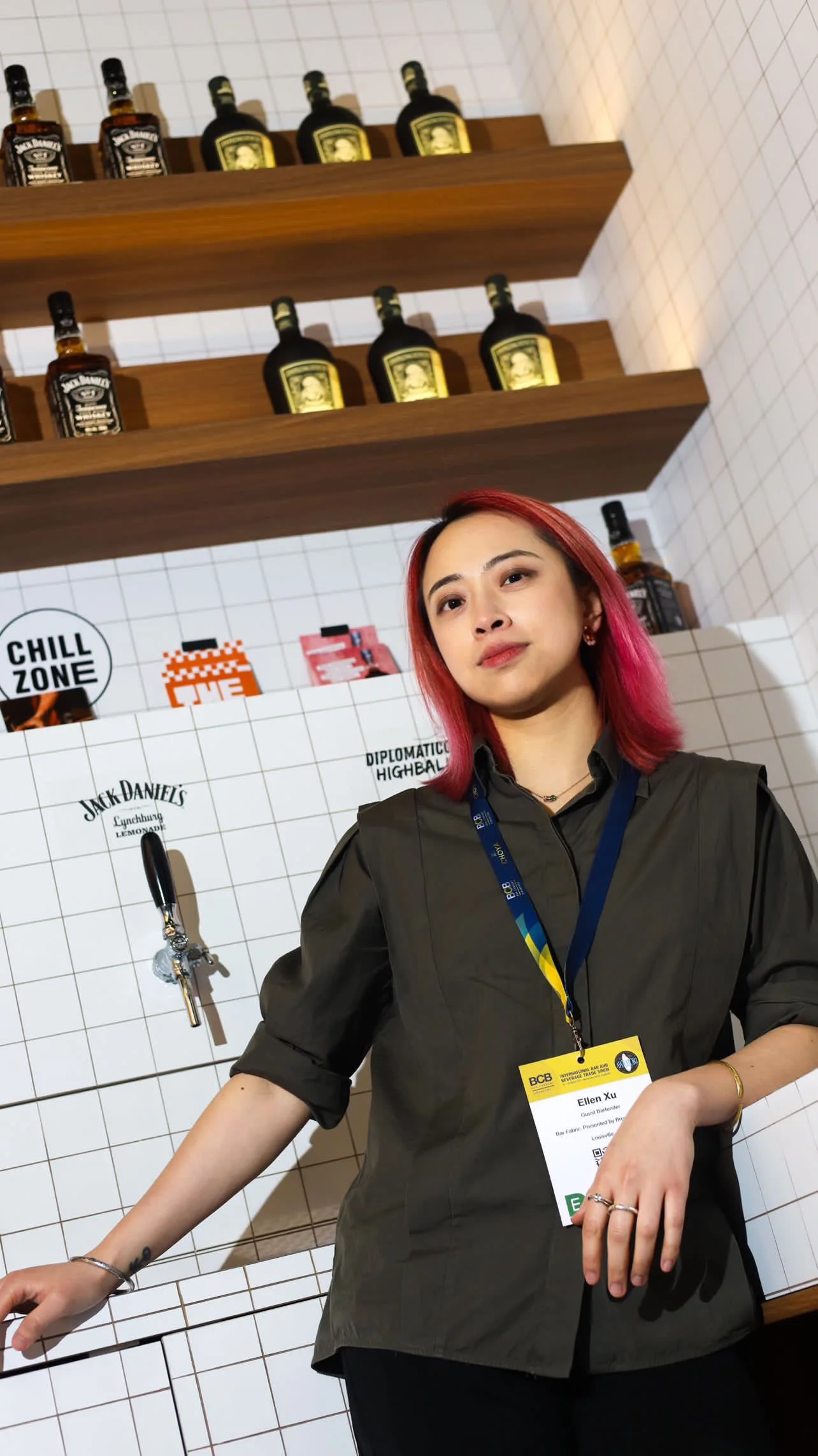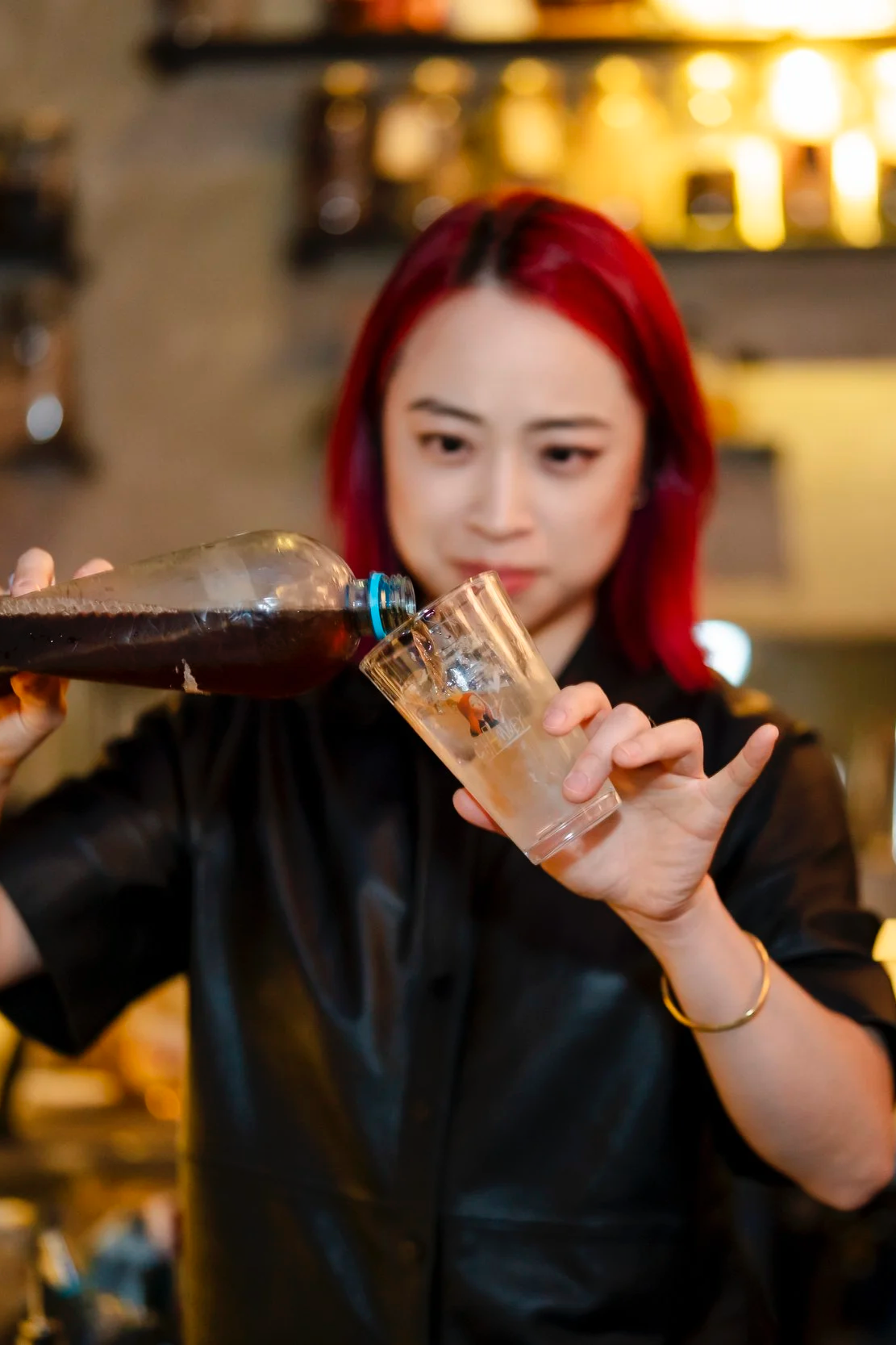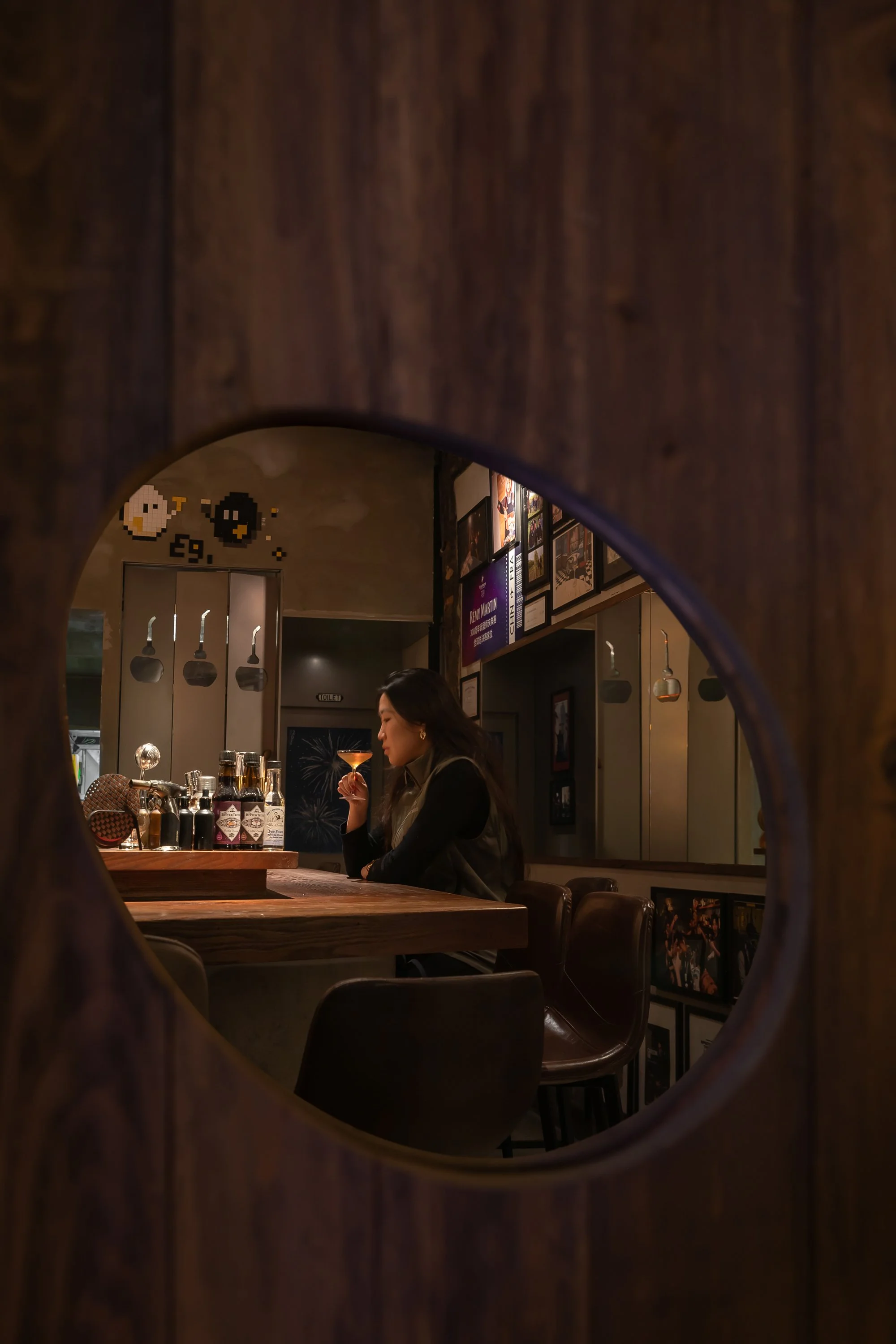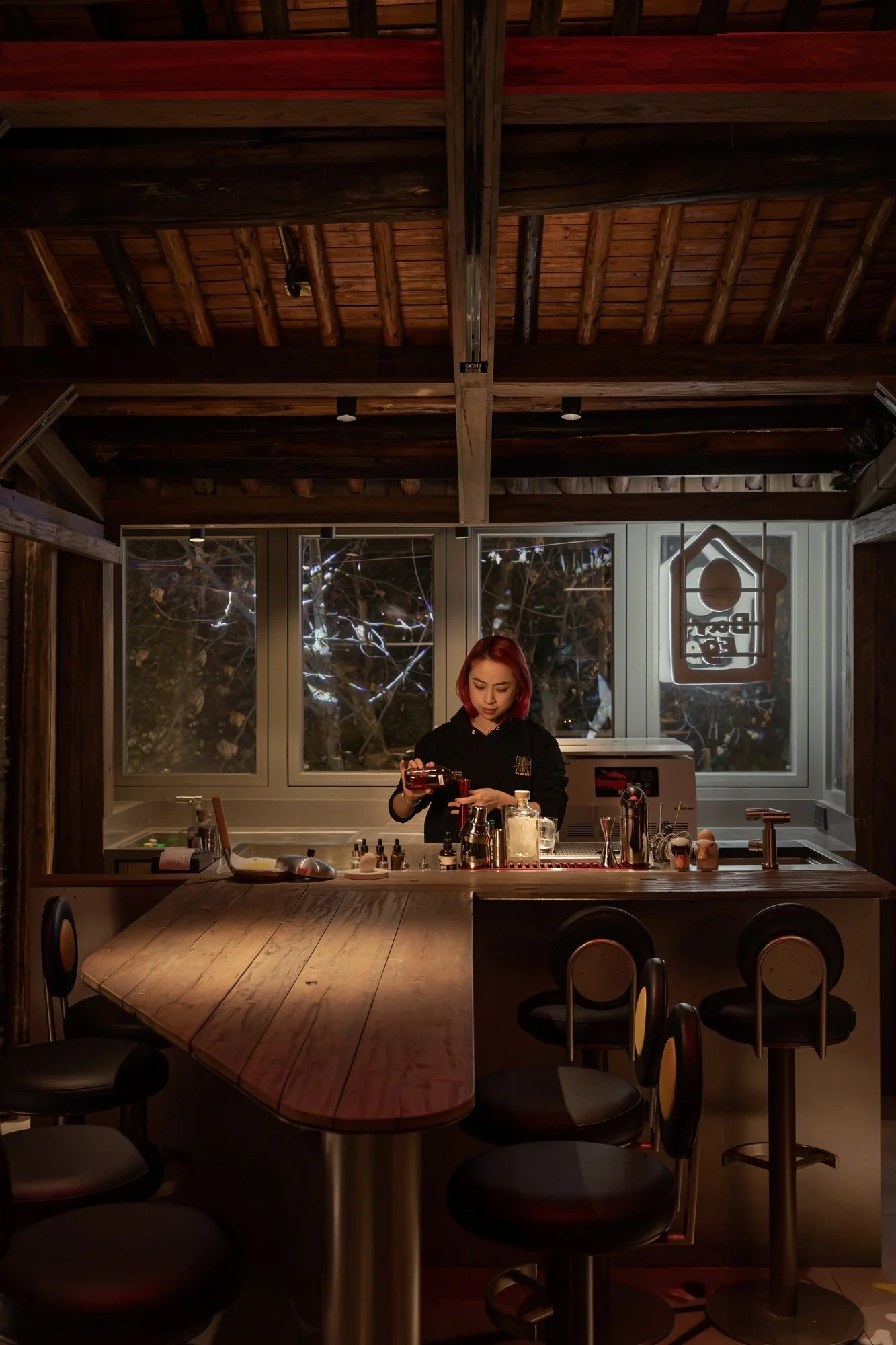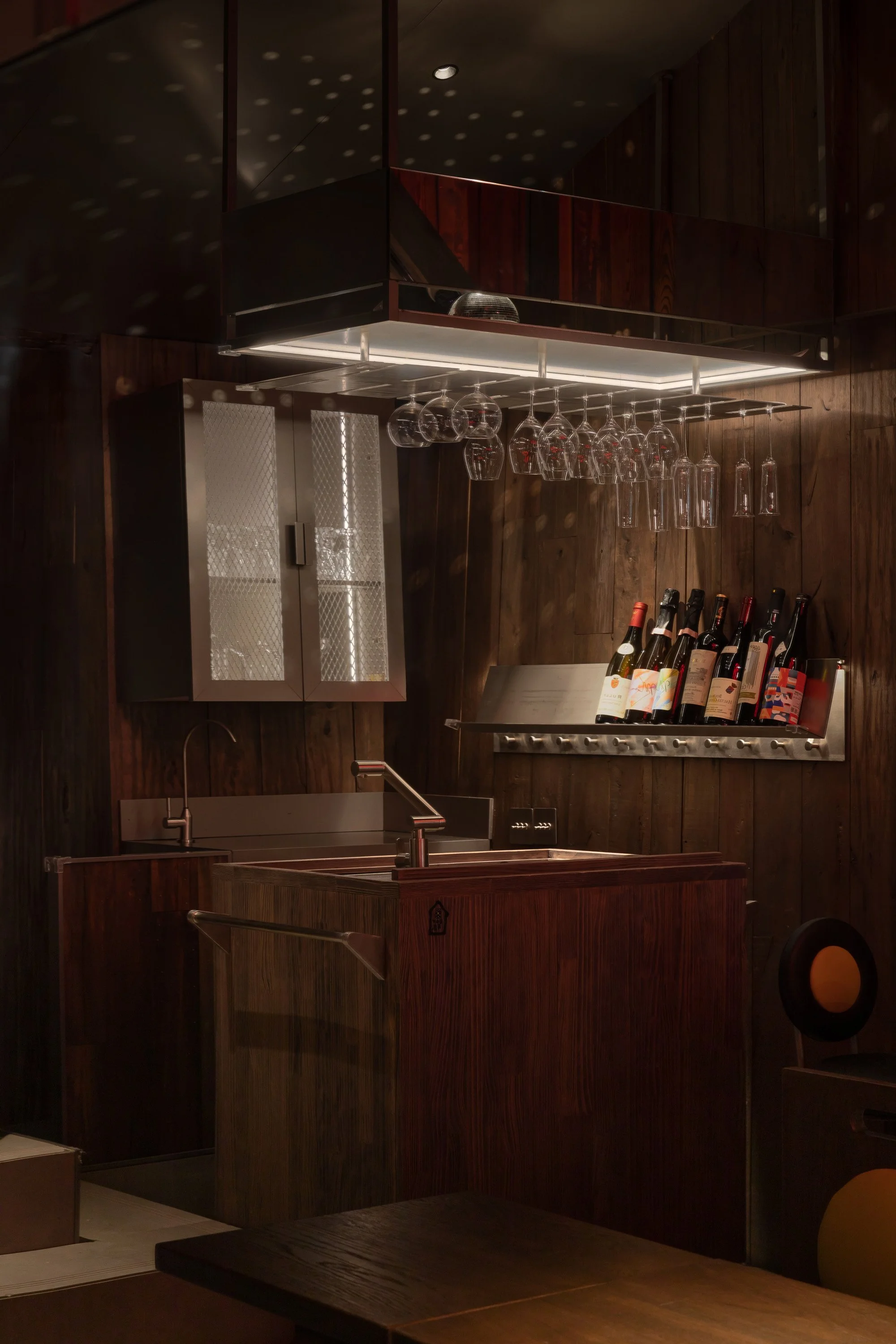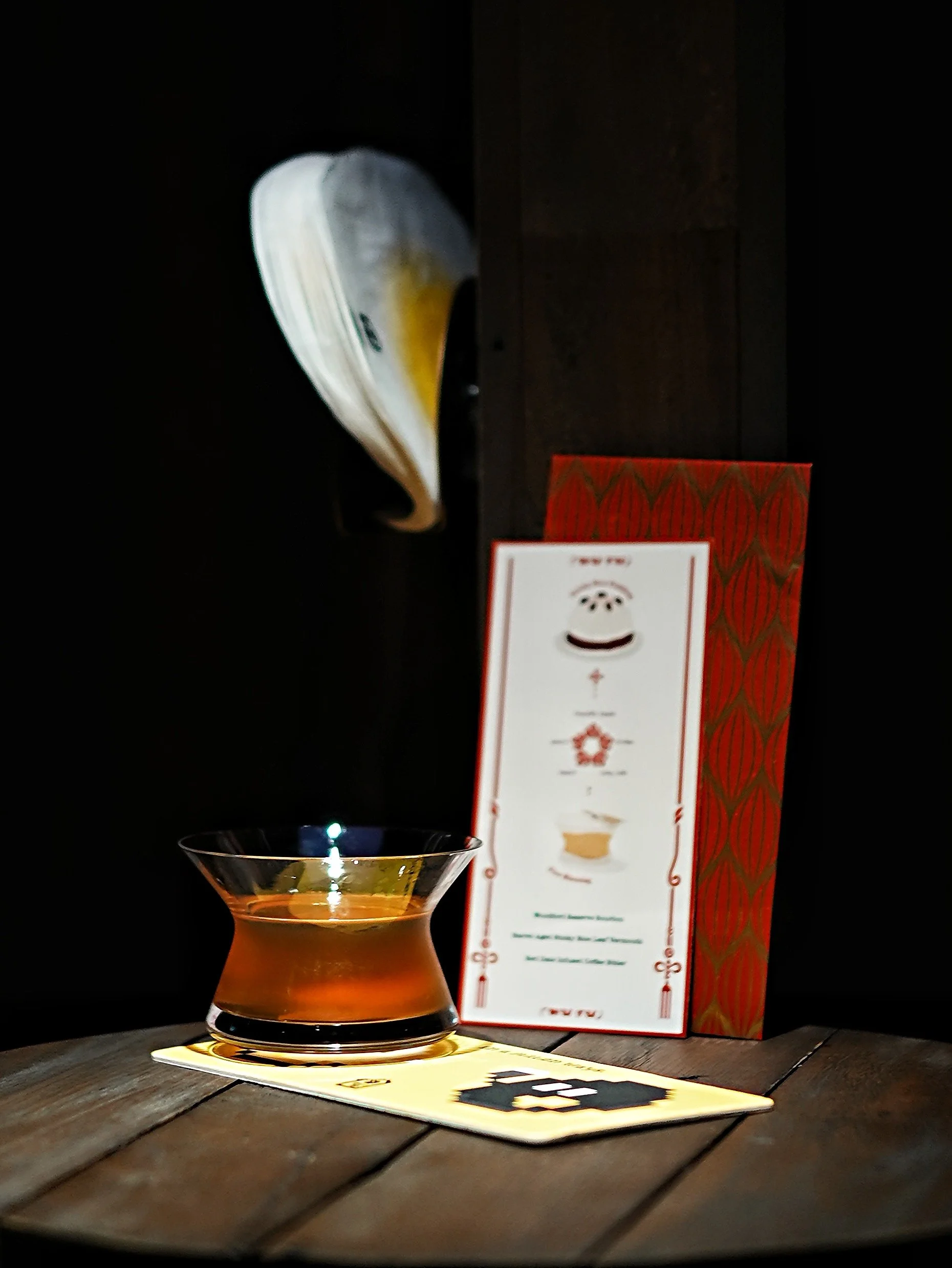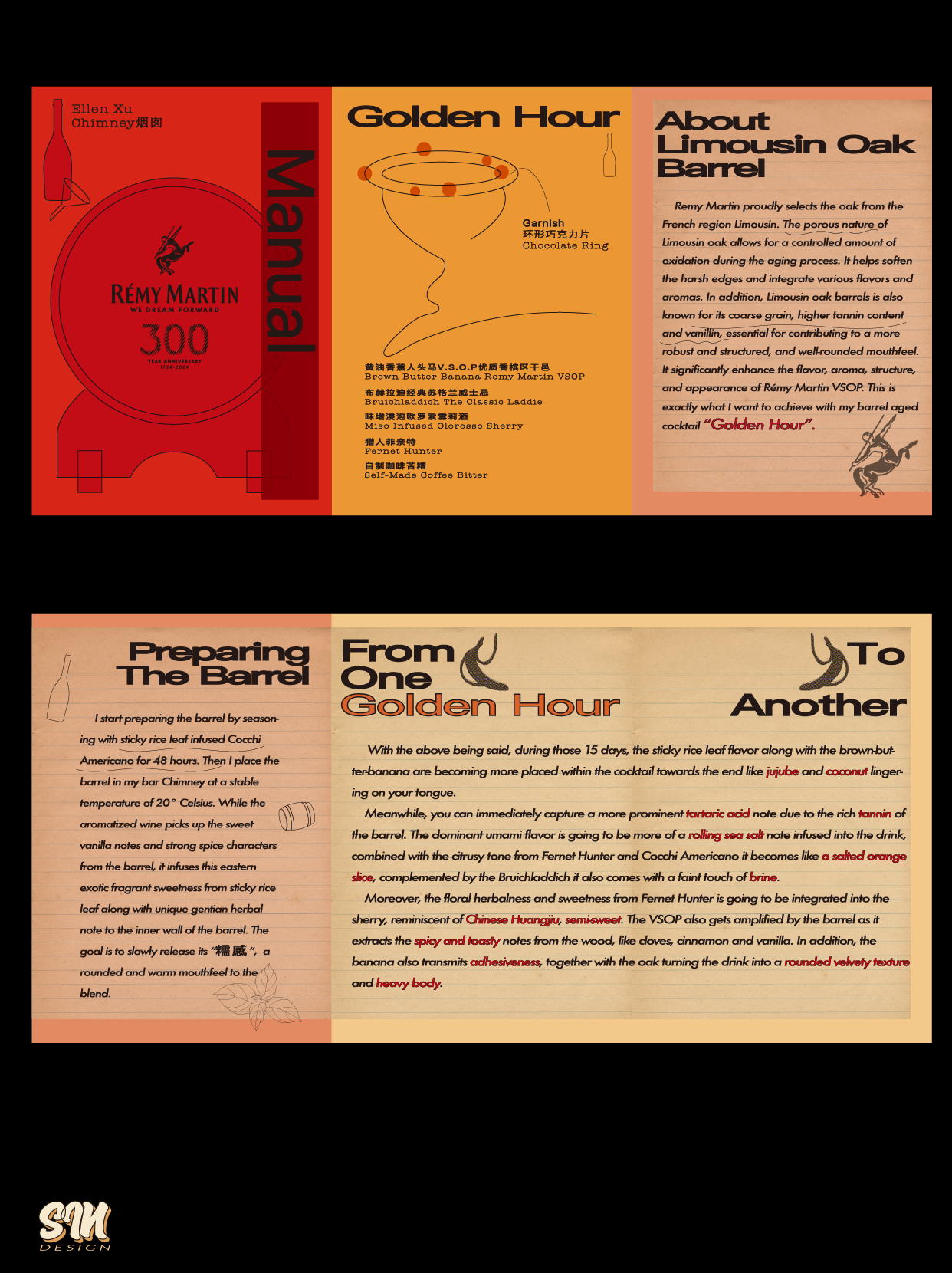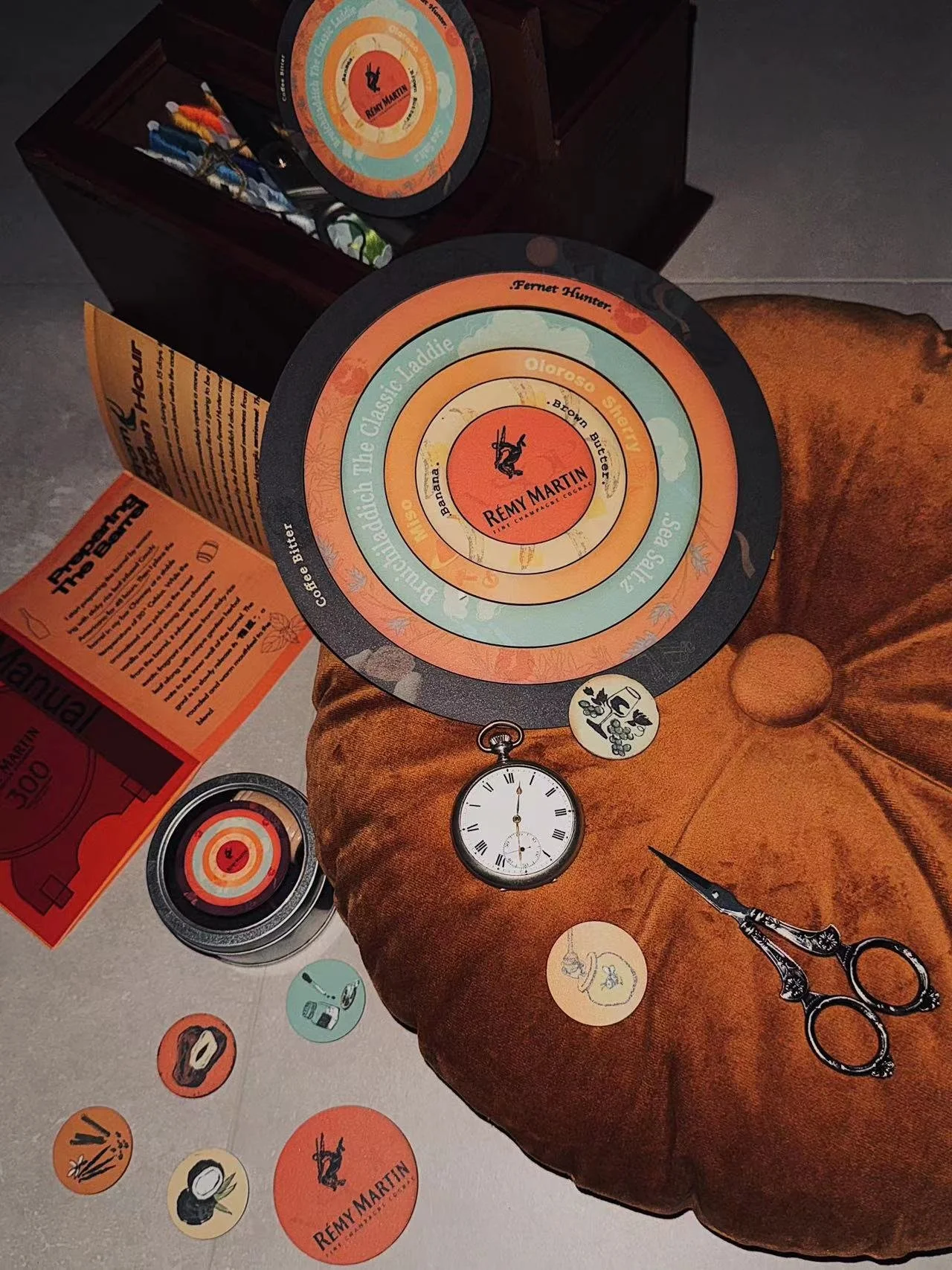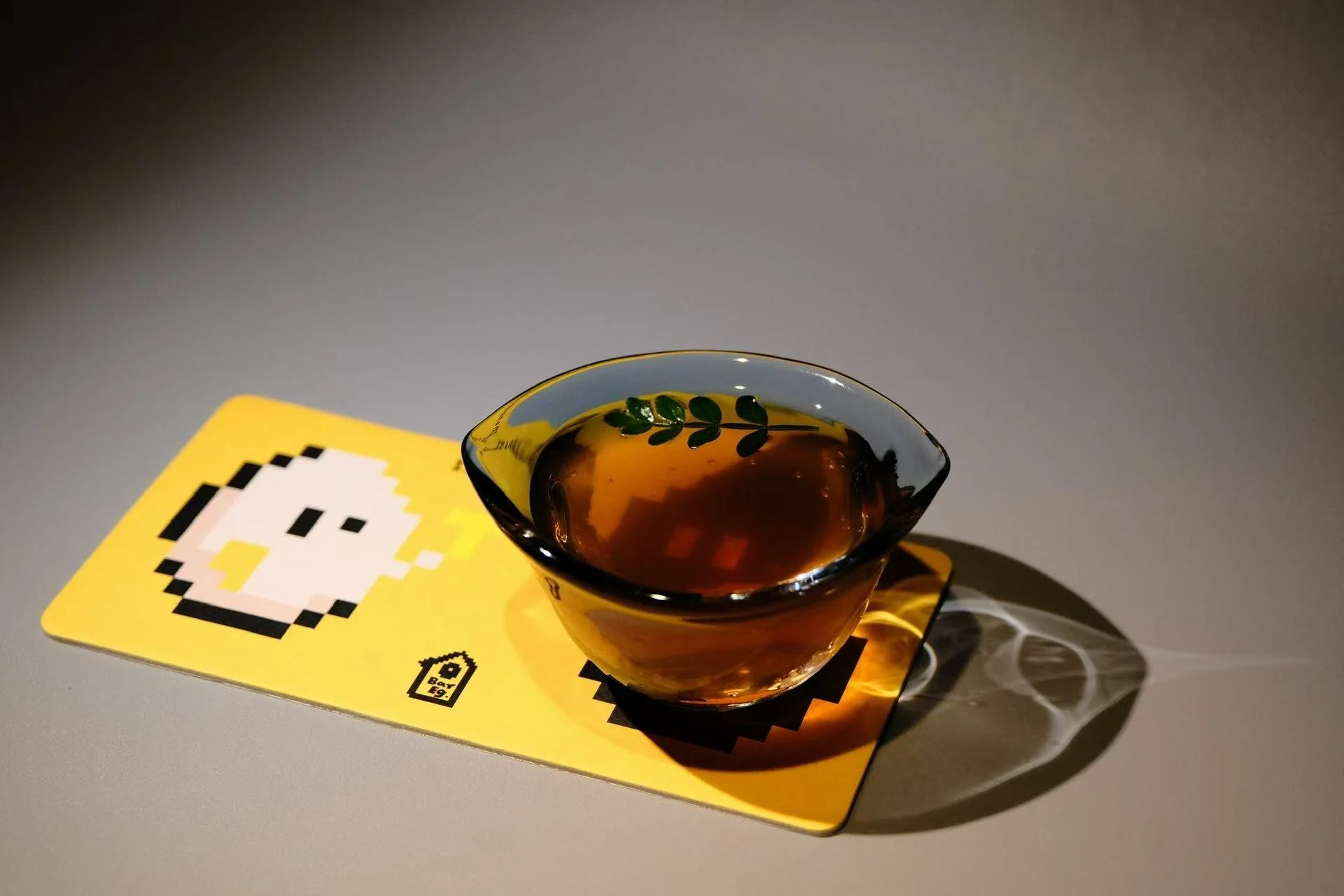w/ Bartender and Founder of Chimney Ellen Xu: “The Drink is Only a Threshold.”
Ellen Xu 徐子画 is the bartender and founder of Chimney and Bar Eg. in Hangzhou. A powerhouse, an entrepreneur, Champion of the 2024 Woodford Reserve The Wonderful Race Grand Final and the 2024 Remy Martin BTA 300 China, and a strong believer in community and culture, Ellen is a storyteller who brings a blend of sensory finesse and soulful connection to every pour.
Article writer: Ariel Xinyu Peng
Hosts: Ariel Xinyu Peng & Hua Hannah Zhong
Podcast audio editor: Ariel Xinyu Peng
Portrait taken by: Hua Hannah Zhong
Article editor: Lily Huang-Voronina
Photos courtesy of Ellen Xu and her team at Chimney
Ellen winning the 2024 Woodford Reserve The Wonderful Race Grand Final
Fried Green Totamoes
The first time I met Ellen was in 2021 in Shanghai, at the bar counter of the old Sober Company. I wasn’t used to talking to strangers at bars back then, and this woman with a thick voice sat next to me and told me that she had not long ago opened a bar of her own called Chimney. Four years later, she’s sitting in my living room in New York, and telling me how Chimney is turning six years old.
As Ellen is not the most predictable person in the world, when she “just jumped on a plane two days ago and flew to New York,” I knew I had to catch her for an interview with THE Lounge. “Change is the only constant,” she says, which might be one of the driving thoughts behind Chimney’s operation, especially with the recent addition of Bar Eg. However, to overlook her meticulousness would be a mistake: I learned later that her decision to approach me at Sober Company wasn’t a random one. She tells us, a bartender (and any person) should “read the body language, read the air, and determine if someone would interact with you, which is also what we do every day: we read the signals of our customers, and see if they are ready for the next round, or if they are satisfied with the current one. So back then I read the air around Ariel and thought, maybe we can be friends.” As a woman bartender and bar owner, Ellen has brought something that I didn’t know I craved: a chance to be, in a safe space, open to anything possible. Ellen and I might have bonded over the experiences of life in America, and over womanhood, it’s her narrative that I am most interested in. As a bar is not a curious place to find friends, it takes more than drinks to keep those friends.Chimney and Bar Eg.
Ariel Xinyu Peng (AP): Can you talk about the idea behind Chimney? Where was your starting point?
Ellen Xu (EX): Chimney is a neighborhood cocktail bar I opened in Hangzhou in 2019, born from the combination of trips and memories from my time in California, back when I was at UC Berkeley. I wasn’t looking to serve the best martini or to make the best whiskey sour but to bring people together and build community. That was when I first wanted to open a bar. It was my Lounge.😉
AP: And what’s Bar Eg.?
EX: It’s a bar within a bar, built on top of Chimney. We launched it officially last month! I wanted to build a space that could sum up my past six years of experience, especially the past two years where I’ve been around the world for competitions, guest shifts… a lot of exchange activities. But why Bar Eg.? [Ellen asks herself. 🤔] Because I love eating eggs—I can eat eggs in a million ways. The egg is a symbol of birth, an incubator. You can always change its form, as bartenders do with drinks—the molecular, the way we extract and infuse flavors, etc.
But what about the drinking experience? What about the space, which can be flexible or functional in a million ways? [She asks again. 🤔] For this, I have a main station and a portable substation, which can also be a gossip corner. As the main station and the communal table form a T shape, you could interact with the guests sitting across from you AND with me, the bartender. There is an egg-shaped light that changes colors everyday and moving mirrors that display liquors, brands—anything we want to showcase. When bartenders from elsewhere perform guest shifts at the main station, I would be at the substation. Depending on the day you come, seats you take, and the angle you’re facing, you crack open the drinking experience in a million ways. The space is not definable. Sometimes when I come to my bar, it feels as though I was on a guest shift.
AP: How did you put together the menu? During my visit to Chimney this January, there was one drink that I liked particularly, “Fried Green Tomato,” whose name is based on one of your favorite movies. Where do you find inspiration?
EX: The menu you experienced actually had a temporary design. For instance, there are bars that have very creatively designed menus that you can play with and gain an experience from reading them. There are also bars with more straightforward menus, listing only names, ingredients, ABV, and glassware types, which sums up the menus at most Japanese bars. I usually use a more complex menu because I like to tell a story. (This is why at competitions, I see myself as a storyteller, then start to bartend.) Therefore, if I design a menu with a specific theme, it’d engage both the customers and me, so we are on the same page—page of the menu. While there isn’t good or bad with a menu design’s style, I couldn’t stick to the more simple ones I’ve used in the past. My biggest fear is getting bored and complacent.
As of now, we are designing a new format for the menu that would showcase every detail of the house! There would be clues on the menu that point to various features of the house, like a treasure hunt. I can always change the elements in the treasure hunt, too, as I’ve always wanted to introduce the space to my customers that doesn’t only involve me showing them around. Together with my designer, we came up with a floor plan. We would be putting all of this into action once I get back to Hangzhou—I travel too much, as I did four competitions last year, which was crazy.
Hua Hannah Zhong (HZ): How did you design Chimney’s logo?
EX: When I first rented the place—when I first entered the space, it was a hawker place, and the chimney was the first thing I saw, up on the balcony. With the addition of Bar Eg., the logo has now become a person coming out of a chimney, while on top of that, there’s an egg. Built on a street of history and heritage, the house itself dates all the way back to the 1920s, while the street, Zhong Shan Middle Road, dates back to the Song Dynasty, 南宋御街. I couldn’t tear down a wooden structure without getting the city’s approval. Chimney in Chinese is about the vibe, 烟火气*. You bring people together and they mingle, drink, and toast to each other. I could never have a better name than that.
*Chinese lesson of the day: Chimney in simplified Chinese is written as 烟囱, where 烟 means smoke.
AP: What are things that people wouldn’t easily notice about building a business, things that are essential to a bar?
EX: When people enter a bar, the drink or the service aren’t the only things they get. Constructing a bar experience includes thinking about what people listen to, smell, and taste; the texture of the table and of the glassware; your mood going to and coming out of the restroom; and, of course, the vibe, the people sitting next to you, how you interact with them. Those are all parts of what we call managing a bar. Shaking cocktails only constitutes about 5% of what we do every day, and everything else can seem negligible for the customers—people pay attention to different things. For instance, from The Cocktail Man by Danil Nevsky, I learned about “bar knowledge VS bar wisdom”: one is about having a clean bar station and nice glassware, and the other is about having a clean restroom. It makes me happy when people tell me how much they love my restroom! In there, we have a CD player, a wooden structure—to section off the space—I tore down from construction and repurposed as part of the house, and fragrance—I even bartend the perfumes in the restroom, to make it a part of the fun. (This came from my takeaway from visiting bars in Japan.) In my training, these are the things I focus on. Eventually, it’s all in the details. The drink is just a threshold.
[Hannah agrees with Ellen strongly.]
Woman in Space
AP: Speaking of space and restroom, with the kind of space you are creating at Chimney, how do you envision safety in a place like a bar, especially for women, queer people, or people who tend to feel unsafe in public space?
EX: Thank you for raising that question! First of all, we’re talking about different cultures here. Where I’m coming from, nobody asks about how to create a safe space or tries to answer it. Maybe some are, but it’s not a priority. However, Chimney is special, because of who I am and my experiences, some things are already included in my point of view, such as respecting diversity. Currently, we are an all-women team, though by coincidence! (Once upon a time, we had mostly male staff.) Our team pays attention to detail, e.g., we discuss what to include in the restroom, such as sanitary products and accessible amenities. Not many bars in Mainland China have those. Nonetheless, I see this becoming a rising topic: for instance, during my recent guest shift at Bar Nature in Xi’an, the owner—a very talented male industry peer—emphasized on how to achieve a female-friendly space in our conversation. Although we don’t make spaces female friendly by talking about it—it is what you do, it’s crucial to include that in the concept design and culture of your bar.
HZ: How do you see the gender dynamics in the bar industry, which has traditionally been dominated by men?
EX: I’ve been asked this kind of question a lot, by friends, industry peers, presses, etc., especially every year during women’s history month. For example, this March, I was invited, among others, by the amazing industry peer Kevin Lai, head mixologist of the St. Regis Macao, to talk at “The Art of Mixology Presents Women Bartenders,” an event highlighting female talents in the bar industry from around the world. In August 2024, I attended “Women with Whiskey,” a lunchtime panel event that brought together people from various whiskey-related industries, including journalists, media professionals, and renowned pioneers in Scotch distilling such as Rachel Barrie and Stephanie Macleod.
Another time was when a passionate and much younger industry peer invited me to talk on her podcast. I’ve been in these discussions so much that I started to see different answers myself. I used to say, I don’t want to talk about it; I don’t want to mention that I’m a female bartender, because I’m just a bartender. You don’t have to emphasize my gender. However, after speaking on the podcast with that young industry peer, I learned that she felt compelled to bring her female identity into these conversations: as a young person, she was only starting to experience the industry’s everyday sexism and challenges that, though appearing minor, a lot of women in her position, having walked her path, have faced. With that said, I often feel like I need to be a role model.
AP: Does that bring you pressure?
EX: That’s a lot of pressure. I’ve been asked the question a lot, “What’s your advice for your fellow female bartenders or peers in the food and beverage industry?” I hate giving advice though, as everybody is so different—they cannot simply follow my path. For example, speaking out is much easier for me than it is for others. They need to develop their own path and always be aware of what’s going on in the world and in the industry, instead of hiding behind her manager, behind a bar, or a so-called career path advice. Always go out there, not only participate in competitions but grab the chance when you can.
HZ: A lot of the times when I go to a bar with a male friend, the bartender would talk to him first. I’ve been on occasions where they only hand out business cards to my male friend, not to me.
EX: This is related to the very stereotypical issues in a male-dominated industry: some bartenders think that the biggest potential customers are men, assuming that they are the ones picking up the bill, making the call, or drinking more… which could all seem very logical to them. On the contrary, at Chimney, I always check with the woman customer first, even when the man sitting next to her could be placing the order, e.g., one old fashioned and one gin tonic. I would ask her, “So you want the gin tonic, right?” I simply want to confirm that this is what she wants. It’s the dynamic you should observe: Who’s getting the next drink? Who drinks faster? Who knows better about what they want? Because you can hear it and see it. If you’re only handing out your business card to the man, you are being lazy, and it’s not smart for business. Hospitality is taking care of everyone on the table. When the bartender or server fails to pay good attention, whoever’s in charge of the floor should: this should be teamwork. Again, that’s why Chimney is so special! We take care of each other, and it’s actually hard to be gender unequal in our space. 💪 Although it’s hard not to notice me when I go out to drink, as my personality is quite dominant, always raising questions, you should not neglect the “soft one” either. You talk to and look at everyone, which is manner, common sense! This is related to training, general environments, and the community.
Cocktail Competitions
AP: How do you usually prepare for a cocktail competition?
EX: Wow, I need another two hours to answer this. Long story short, I prepare by not sleeping. Instead, I sleep with it: I eat with it, drive with it, go to workout with it... It’s all you think about: you are so focused on the preparation that nothing else exists… you are zen.🧘♀️
But first, you do tons of research. About the brand, the people who distill, ferment, make the barrel, etc. I’d know that distiller’s background, their daughter’s background, and all my judges’ resumes—it’s like preparing for an interview. For the judges, I might present to them something they can echo with, such as a glassware or an ingredient. In developing ideas, I often find inspiration by talking with friends from different backgrounds.
In a competition, the drink only makes up about 1/4 of it; again, the drink is a threshold. You need a story beyond “this is my childhood taste and memory,” or “strawberry goes well with gin, so I added strawberry.” People talk about themselves all the time, but why should we listen to you? Your story has to depart, logically, from the brand and its base liquor, such as the bourbon, the gin, the cognac… Furthermore, you should give a good presentation while showcasing your techniques, because you’re a bartender, and you need to look out for everyone, e.g., notice if a judge’s water glass is empty. You might introduce an ingredient to the judges by giving them something to smell. Eventually, the judges get tired from tasting 40-50 cocktails per day, so you have to give them a unique, fun experience.
A year ago (June 6), I won the trophy for the Woodford Reserve* competition in Kentucky. Before the competition, I was so afraid that my ingredients would taste off, such as the cinnamon and the tea, so I asked my friends who went to see me compete to bring extra for me as insurance.
So how do I prepare? [She asks again. 🤔] By not sleeping, all the way from the glassware to the manual, the ingredients… It does get exhausting at some point, but you have to keep the energy going. You keep practicing until the end of the world.
*Ellen’s winner drink 五福, pronounced as wǔ fú, phonetically similar to Woodford, means five blessings.
AP: You told me that some people have said, “Ellen won because she speaks English,” especially at global competitions. How much does the talk matter at a competition and how do you perceive such comments?
EX: This is human nature: people want to find reasons for those who succeed, and excuses for when they themselves fail. Speaking English is not the most important thing in a competition, because it’s not part of the grading criteria! I know Japanese bartenders who only speak Japanese and won global competitions. You only need to speak the language that you are most familiar with; like the analogy, “you shake the way you like.” It doesn’t matter if you shake whiskey sour with egg white in a Boston shaker—you can totally shake it with a Cobbler. Shake in the way you’ve trained yourself for. It’s the same with language: it is not a barrier but a way in which you present yourself. Again, the flavor of the drink is only a threshold. But are you digging deep enough to connect with the brand? To connect with two cultures?
AP: Do you think you kind of serve as the bridge between cultures?
EX: All the time. It’s what I signed up for, by opening Chimney.
Her Hometown Hangzhou
AP: How has your hometown influenced you? During my visit to Chimney, I had 肉燕, a delicacy from your hometown, Zhejiang. Do you bring your hometown into your drinks and work?
EX: It definitely went into my competition drinks for both Woodford Reserve and Remy Martin, because it was part of the criteria. If I’m facing customers in Hangzhou or in China, I talk about my global experiences; when I go abroad, I talk about my hometown experiences. It’s again like bridging.
AP: Why did you choose Hangzhou to be Chimney’s home? What is the drinking culture like there?
EX: I chose Hangzhou because it is my hometown. I wanted Chimney to be closer to my grandma, the most important person in my life. A few years back, Hangzhou seemed to be flourishing, but there’s not much drinking culture. The drinking scene in Mainland China is still the most vibrant in Shanghai. The market in Hangzhou is quite different, and together with the industry paint the picture for the drinking culture. As there are bars, perhaps the ones you visit every day and might be in very good business, they might not be connected with brands or industry events. On the other hand, there are industry bars, the ones you see often in Shanghai, such as Sober Company, TOC, Union Training Company… The way these bars interact with the market is different from others. There aren’t many industry bars in Hangzhou, though I consider Chimney as one, since we work with brands often.
AP: Where do you go to drink in Hangzhou?
EX: Dr. Ink, or 墨水. When you write it out in English, it’s Drink.
[Ariel gets angry at the literal joke.]
About People
AP: Do you think bartenders or owners who are more reserved carry less strength? Since talking and interacting with people is such a huge part of your daily job.
EX: I’ve had this conversation with many bartenders who are introverts, and often they say, “if it’s my work I’ll do it,” and go back to quiet mode after work.
AP: Do you think they enjoy the work less, and does enjoying it less make it harder for them to work?
EX: I think they’ll be very happy if they encounter someone they really want to talk with, and when that happens, the experience becomes extra special, overcoming the less happy ones. The 1% is all they need to keep going.
HZ: What is something that you’ve discovered about people?
EX: This is a very sad answer: hospitality is dealing with people, and with the product you’re serving. When you have that many people coming through the door every day, you’ll find that people change all the time—change is the only constant of the world—and you need to manage that because you are building a business on top of it. It’s different from making friends, where you can be mutual with each other, but hospitality is always thinking from the other person’s angle. On the other hand, now in its sixth year, Chimney sees a new staff team annually. People come and go. The fact that we can meet here is so fucking rare! Unfortunately, I’ve gotten used to the fast-food-like relationship with people, as you cannot engage with one too deeply in my line of work. What I seek are long-term relationships, so I tend to speak less now.*
HZ: One thing I’ve sensed in the past few years is that 酒友 is always changing. The friends who share a drink with me come and go.
*Ariel’s note: Ellen tells us that sometimes people come to Chimney and order her competition drinks as a way to test her, to judge if she’s actually good enough for her titles, with nothing else in mind. (With the number of people she sees each day, I trust her instincts on this.) During my visit to Chimney, for each drink she presented to me, Ellen gave a little speech, told a story. However, with one of the drinks, she didn’t. I was kind of bummed, so I said, “Why didn’t you talk about it!” Ellen laughed and came back, and told me another story.
AP: People tend to forget after drinking: they black out, forget and cancel what they said the day before. Do you find yourself having a lot of repeated conversations in the past years?
EX: I don’t drink when I work. You can drink a shot with a customer, but we don’t allow heavy drinking at work, because your tastes would be off. We also observe if we should pour people another drink, because we wouldn’t want them to bother those sitting next to them, disrupting our vibe, hurting the culture we are building. When that happens, we need to reflect on ourselves. For example, if there’s a customer who’s had, say, six godfathers and is clearly not doing well, I’d cut them off at their seventh and tell them, if you want another, come back tomorrow.
AP: Do they take it well?
EX: Nope. 🙂After years of dealing with drunk people, there are house rules to be set, such as establishing last calls, telling people “we’re not making drinks anymore,” or pouring them a lot of water. Again, we take care of people first: observe and read the air. Essentially, I do not need another drink’s revenue, even when they want to open a bottle of Yamazaki 12 Years…
AP: They always want to open the Yamazaki 12 Years.
EX: Oh, that was a joke.
AP: That’s the go-to joke!
EX: Well, this came from experience: a drunken old(er) man once opened two bottles, a Yamazaki and a Remy Martin, OX. However, of the second bottle he opened, he only had two glasses, so I only put two glasses on his bill. When he saw that, he said, “You don’t think I’m rich enough to get two bottles?” He thought that I undercharged him and started to curse. I called the police, and they took him to the station. This guy even 耍酒疯 at the station: he went crazy and peed in front of all the police officers. One hour later, he woke up, and paid his bill. I, in good conscience, only charged him for one bottle, and I regret not charging him for two. That was the example of not letting people open a bottle after they’re drunk.
(AP: That’s what happens when you don’t let them have their bottle.)
EX: However, getting taken away by the police was the least dangerous thing that could happen—what if they hurt you?
AP: That’s what I’d worry about, too.
EX: We want peace, culture, and long term. We need to protect our community. If they are not our target customer, we do not need their money. Eventually, if there’s a person walking in and wanting to open a bottle of whiskey, they’re not likely to come back to Chimney again. That’d be a random customer, which appears in every bar.
HZ: If Chiminy were a person. What kind of personality would it have?
EX: Since I built the place, brick by brick, and even painted the walls myself, I’m part of the wall. The personality is, of course, extroverted, which is not only about loving to be around people but about getting energy from your community, as teamwork is extremely important for us.
AP: To echo the question you proposed on Chimney’s 5th birthday last year: Where do you see yourself in five years?
EX: I like to ask people this kind of questions because it gives you a sense of who they are, whether they make plans, as I’ve no idea where I’ll be or what I’ll do in 5 five years. However, if you dwell on that question, it gives you something to think about in that moment. Five years is a long time, especially with COVID in between. I do think that I love this industry, so I won’t leave it. But I do hope to go back to school, and do something that is “plus” to myself, so I can do my job better: being a bar owner and managing a business is always about giving, and it’s easy to deplete yourself, lose your time, your sleep, your health… especially since I’ve done so many competitions. However, the global-exchange experiences were so nutritious to me that they’ve always kept me going, so I do hope to gain more of them. From my discussion with my best friend and industry mentor, Lola, who’s like a big sister to me, we agreed that there aren’t enough international bartenders in Mainland China. While there are a lot of talented, genius bartenders and very good bars, the world is not seeing them. So we thought it would give us, the ones that have the opportunities to speak out, a special mission to be the voice and the face of this industry, and share the stories of our home, our origins, the women bartenders, and many more people like us. That would be my big mission. AND—if it’s not fun, I’m not doing it.
AP: This is what we do at Mother Tongue! We’re giving people a place to voice themselves :)
Special thanks to:
KRay, who got me to see that, maybe, it’s not such a bad thing talking to strangers at bars.
And R, for being on the same side of the bar with me that night at Chimney.

